Yulia Karpova is a third-generation hockey mind. She follows a father whose playing career spanned more than 20 years, and a grandfather who is one of the more renowned coaches in Soviet Union hockey lore. Hockey is part of her essence, and she utilizes her knowledge of the game to help other women to grow in the sport that she loves.
Karpova is the assistant coach for Dinamo Saint Petersburg in the Russian Women’s Hockey League (WHL). The WHL is anglicized from Женская хоккейная лига (ЖХЛ), while Dinamo’s club is written in Cyrillic as Динамо Санкт-Петербург. Both the league and its teams are comparable to North America’s NWHL, Sweden’s SDHL and Finland’s Naisten Liiga as professional women’s hockey leagues from across the globe.
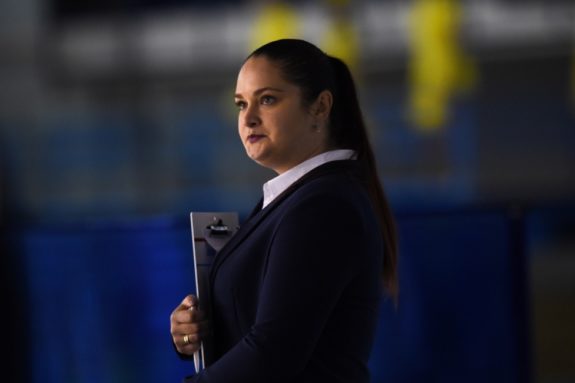
At 35 years old, Karpova has been with Dinamo since the 2013-14 season – initially as a player, followed by assuming the assistant coaching duties in 2016-17. She stands alongside the team’s head coach, Alexander Zybin.
With the 2018-19 WHL season now concluded, Karpova spoke one-on-one with THW regarding her coaching career and how it came about. While Russian is a common language between both Karpova and this writer, we stuck to English during our conversation. In addition to “hockey talk”, we both agreed that Saint-Petersburg is one of the most wonderful cities to visit in the world – a mecca of sorts.
Hockey Is a Family Affair for Karpova
Karpova was born on Jan. 16, 1984 in Moscow, Russia. Though initially raised behind the Iron Curtain, she spent the ages of six through 10 growing up in Finland while her father Sergei played hockey in the I-Divisioona, which was the second level of Finnish ice hockey from 1974-2000.
“My ice hockey career is very long because all of my life has been near (the game),” Karpova explained. “My grandfather was a very well-known ice hockey coach in the USSR. He was a very good coach. And my father was a very good player. He played many, many years in Russia and in Finland. When I was small, we lived in Finland and I was all the time near the ice hockey arena, ice hockey players. And from when I was small I wanted to play ice hockey.”
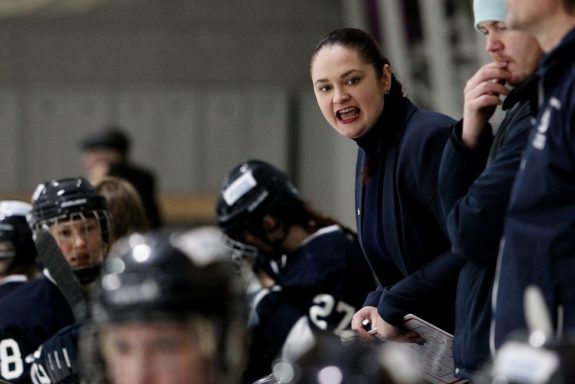
Sergei Karpov’s hockey career began with the 1976-77 season for Spartak Moscow, until his retirement following the 1996-97 season. He won a gold medal for the Soviet Union at the 1979 World Junior Ice Hockey Championships in Karlstad and Karlskoga, Sweden. Fellow members of that Soviet squad included Hockey Hall of Famer Igor Larionov, and fellow “Green Unit” members Vladimir Krutov and Alexei Kasatonov.
At the time of his retirement, Sergei had played nearly 500 games in the Russia’s top hockey leagues, and their Soviet precursor. He additionally played nearly 200 games in Finland.
Karpova’s grandfather Nikolai Karpov was an Olympic bronze medalist for the Soviets at the 1960 Winter Olympics in Squaw Valley, California. After finishing his own hockey playing career in Finland, he returned to Russia where he became head coach for Spartak Moscow. Nikolai coached Soviet and Russian teams for all of the 1970s and well into the 1980s. He even coached Japan’s Men’s National Hockey Team at the 1972 Winter Olympics in Sapporo, Japan.
Indeed, Karpova’s hockey roots run most deeply.
“I asked my grandfather to bring me to the rink in Finland,” Karpova remembered from her childhood, laughing at the same time. “I wanted to try to play ice hockey but none of them – not even my grandfather, nor even my father – wanted a girl to play. But I kept asking them all the time – asking, asking, asking – and eventually my grandfather brought me to the ice hockey school, Spartak Moscow. It was my first time. That was 1996 when I started to play, started to train there. After two years, I grew up and I played on the main team. In 1998 I started to play in the Russian Championship.”
Playing the Game and Family of Her Own
After a few years of playing for Spartak, Karpova would be asked to join one of the top programs in Russian women’s hockey, SKIF. At the time that she joined the team, SKIF was located in Moscow and included many women’s players from the Russian national team alongside Karpova.
Following some problems with the club in Moscow, the team eventually relocated to the city of Nizhny Novgorod where it has been ever since. After remaining with the team in its new city for a few months, Karpova decided to put her hockey career on hiatus and move to Saint-Petersburg. The city itself is a cultural center to the world, and is filled with rich history, literature, architecture, music and art.
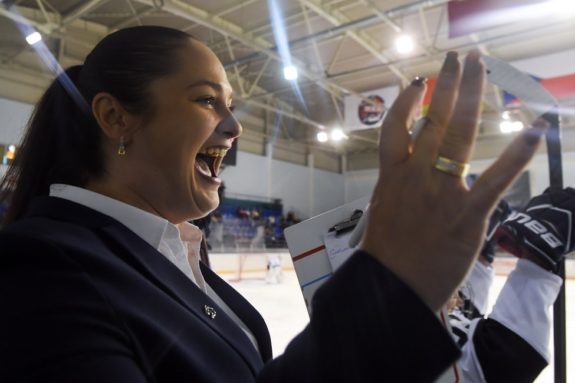
The decision to move to Saint Petersburg was made easier for Karpova, as by this point she was starting a family of her own.
“I decided to end my professional career at this point because I met my husband and we married,” Karpova explained. “And after that we moved to Saint Petersburg to live. And here is where I was pregnant. In this period of time, I didn’t play professional hockey but I did coach small boys, and non-professional men’s and women’s. I played with them too until I was six months pregnant, and I coached until I was eight months pregnant.”
Karpova Returns to Professional Hockey
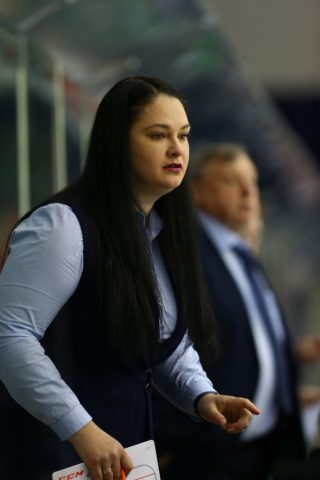
What rings true throughout our conversation with Karpova is that the door to the hockey rink never completely closes on a player. Life changes and our world revolves, but hockey is not something that ever fully eludes those whom the game was meant for.
“When my daughter was born,” Karpova remembered back to around 2009, “after a few months I tried to go back to a professional career. I was trying to play with Dinamo Yekaterinburg, but it lasted only one year in which I was playing for them. Not like I was training all the time – I’d just come in to play the games and then go home because my daugher was very small. But after that, I decided that I wanted to play again because when you’ve played ice hockey for so much time, you’ll never forget that time – you will always want to play ice hockey.”
Karpova would be sought professionally by Ufa Agidel. Like many women who play professional hockey, she endured hardships in order to keep playing the game. Karpova moved with her daughter from Saint Petersburg to Ufa – a 26-hour journey by car into central Russia. She would play with Agidel for two seasons. There Karpova served as a the team’s captain, while playing in 78 games and generating seven goals and 24 assists as a blueliner.
It Was Time to Come Home
Imagine the situation that Karpova was in. The need to satisfy her hunger to play professionally – and still plenty young enough to do so – and yet, having to live more than a day’s journey from her home while on the road with her young daughter. But Karpova’s patience and commitment paid off and ultimately allowed her life to come full circle. A women’s hockey team would be established in Saint Petersburg (also named Dinamo) beginning with the 2013-14 season, and that afforded her a chance to come back home.
“I was thinking about staying with Ufa,” Karpova remembered about how the pieces all came together, “but the team in Saint Petersburg was made, and they advised me to come and play for them. I was thinking for a long time, but decided that it’s right to be in Saint Petersburg because here’s my family. Here’s my husband. Here’s my home. And it’s right to live here. I decided to come here to Dinamo. We started a new team and a new league after Ufa. I very much love this team. I’m very thankful for our management, our coaches because it was a really interesting time for me as a player. I saw a lot of new things, and learned new plays.”
Karpova Goes From Playing to Coaching
Karpova would play three full seasons with Dinamo. Through 94 games with the team she scored 11 goals and 32 assists as a Dinamo defender. Returning to home and family, in addition to the success she had found on the ice all along, ultimately led to her present coaching position which began shortly after the 2015-16 WHL season had concluded.
“After three years I still wanted to keep playing, but there was a issue with the coach,” she explained. “Our director advised me to try coaching because I know women’s ice hockey. I know players, I know girls, I know the physical aspects of the game, I know some things about movement and skating. And that’s why I started coaching. It was very scary for me because I played a long time with many girls, and I understood how it was difficult for me and how difficult it was for them – they were my friends, and now I’m their coach.”
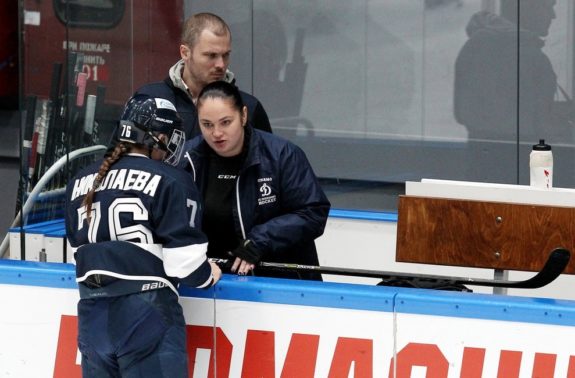
When Karpova stepped behind the bench for 2016-17, the Dinamo roster was comprised with players not unfamiliar to North American fans. Former NWHL goalie Maria Sorokina was in net. PyeongChang Olympians Diana Kanayeva and Yevgenia Dyupina were also on the squad.
Any perceived difficulties between the players and Karpova’s new position with the team were quickly alleviated, as both players and coach worked in unison.
“We learned together to understand,” Karpova shared. “I explained that in some things I understand that it’s very difficult because I know some of their secrets and feelings. But it’s good that I’m a woman. I can explain to the head coach some things about the girls, and what is going on inside their heads and hearts so that the coach can do the right things on the ice.”
The Coaching Tandem and Family
Karpova is very much appreciative that the director for Dinamo Saint Petersburg placed Alexander Zybin at the helm. She admires Zybin as a coach, and values the experience that he brings to the team. Not only are the Dinamo players learning from him, but Karpova is learning a great deal as well. That in turn allows her to better utilize her own capabilities. The two are a solid tandem on the bench.
“Together we built a great team,” Karpova said warmly. “We don’t have a lot of the best players in the league, but we have the very best team-oriented team. We win all the time not because we’re very strong – we win because we are one collective team, one family.”
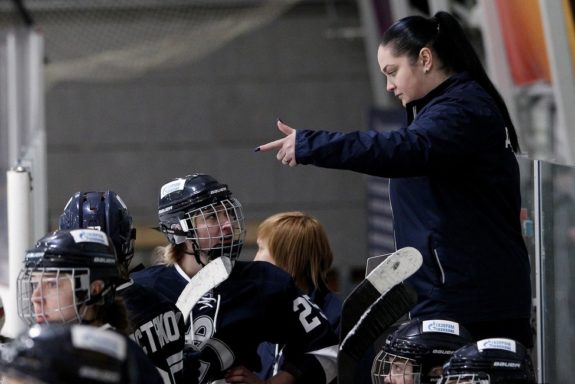
The 2018-19 version of Dinamo Saint Petersburg is a very unique blend of talent. Dyupina and Kanayeva continued to be top-end players. Dinamo’s leading point scorer was 23-year-old Czech defender Aneta Tejralová. Nina Baranova (16), Irina Tsatsyna (17) and Kristina Glukharyova (15) were all teenagers, while forward Yekaterina Smolina will turn 31 in October 2019.
But the member of Dinamo are far more to Karpova than simply a variety of players wearing the same uniform.
“My girls for me are like my daughters, my sisters,” she said proudly. “Because I love them very much, and I’m interested in their lives. It is very important to know what happens in the lives of your players. Some of them I have known for more than 10 years, and I look at how they’ve grown up. How they are now a woman, how they have built their families, how they have grown. It is very interesting to me and very important to me.”
For the younger players on the team, Karpova very much tries to instill within them the importance of looking up to the older players, and replicating the actions and behavior that they see – both on the ice and off of it. She continued on to say with a lot of pride and admiration:
“I say all the time that for me the team is my second family because we spend a lot of time with each other. When you want to go to your work, when you want to meet your girls, when you want to meet your players, when you want to spend the time with them, and it’s very important that they feel the same thing. So for me, they’re like my daughters.”
The Family Tradition Continues On
Of course, Karpova also has her own biological daughter too. 10-year-old Aleksandra is the fourth generation of “Karpov hockey”, and plays for a boys team in Saint Petersburg named SKA-Gazprombank. Karpova does offer her daughter tips and guidance, but otherwise does not interfere with the tutelage Aleksandra receives from her own coach.
“I’m not coaching her with skating or anything like that,” Karpova shared, “but I’ll explain to her what she must do in particular moments or situations. My daughter is a defender like me and all of my family. My grandfather, my father, me – we all were defense. I explain those types of things to her. In the summer, I work with her of course on physical things for training. But she has a coach, and he must be the one to teach her and coach her.”
Along with being Dinamo’s assistant coach, Karpova has recently accepted a position as a head coach too. Upon the close of the 2018-19 WHL season, she was asked to assume the head duties for a Saint Petersburg Girls U18 team.
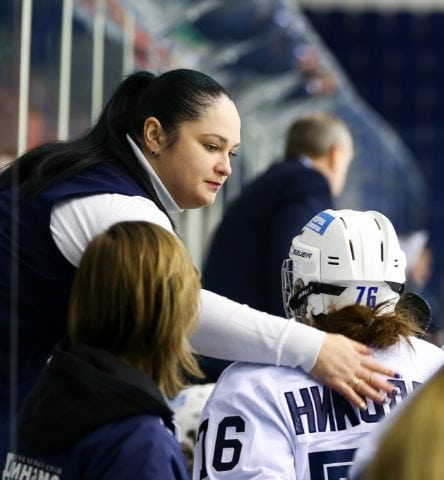
“It’s very interesting for me because the girls are our future for Russian hockey,” Karpova stated. “It’s really nice to see that there’s a lot of good ice hockey players growing up.”
Karpova has many more years ahead of her to sculpt hockey players and help them to reach their fullest potential. No matter where she has gone in her life, hockey has always been there for her. While postponements from the game have certainly happened, hockey has always sought and found her services. Again, it is in Karpova’s essence and has long been at the heart of her family.
“The main thing that I understand,” she explained to THW, “is that if you even one time try to play ice hockey, you would never see your life without ice hockey. And ice hockey makes you strong. A righteous, goodhearted person. You have an understanding of what you must do in life, and when you must do it.”